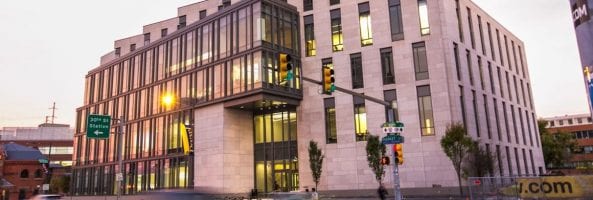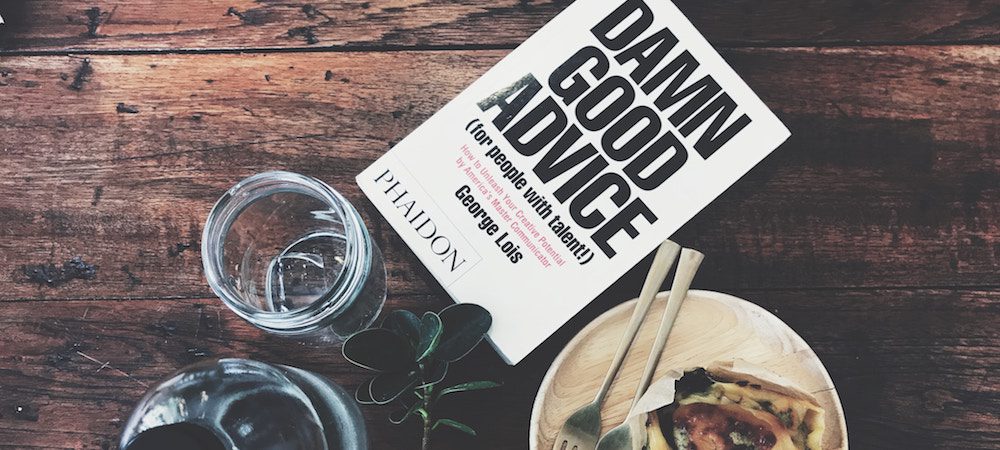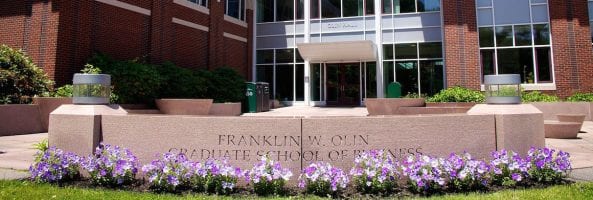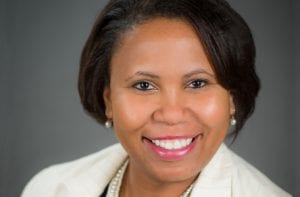Drexel LeBow MBA Admissions Answers 5 Questions

In our latest installment of the MetroMBA “5 Questions” series, we speak with Kate Sonstein, Associate Director of Graduate Recruitment & Admissions at the Drexel University Lebow College of Business. Sonstein discusses the importance of experiential learning and the quality of the students, staff, and faculty at LeBow.
1. What advice would you give an MBA candidate interested in Drexel LeBow?

“There are so many great things to think about when coming back to get your MBA, and sometimes it can be overwhelming. My best advice includes two simple things: be yourself and put your best foot forward on your application.
It’s important that you’re true to your personality and qualities in the admissions process because you are looking for an MBA that is the best fit for you, not your friend or colleague. You are on a search to find a home for the next 1.5-2 years of your life, and it is important that the MBA you select meets your individual needs at an academic, personal, and professional level. Otherwise, you could end up with a program that does not provide the type of interaction that is the best fit for you.
You also need to gain an understanding of the program and school where you are applying and demonstrate that in your essay and communications. Don’t just Google a few classes and stick them in your essay—believe me, we can tell. Big tip: spell check everything! And make sure your recommenders know why you are applying so they can write you an impactful letter. The best applications are those that are unique and showcase your strongest qualities, but also those that are genuine.”
2. What is Drexel LeBow’s greatest asset and what do you wish MBA students knew more about?
“Drexel LeBow is a community of ambitious, hard-working people who are striving to be the brightest and the best in their field. At Drexel LeBow, we are your greatest asset—our faculty, both with high impact research and industry collaboration; our staff, including our experienced career services team and involved college leadership; our advisors, guiding you through your experience every step of the way; and our students, go-getters always striving to be the best in every aspect of their experience.
I think our MBAs are still learning more about our newest feature in the curriculum: graduate minors. Graduate minors at Drexel are an opportunity to build an additional functional area of study at the graduate level through courses offered in other subject areas. Minors are offered across the university in over 50 different disciplines including data science, health administration, project management, and business analytics management. Minors can be built into the Drexel LeBow MBA plan of study without any additional courses—students simply put their 18 free elective credits towards their minor.”
3. What opportunities, outside of the classroom, does LeBow offer MBA students to get hands-on experience?

“Hands-on experience is crucial to the graduate experience, particularly in an MBA program. At LeBow, both our full-time and part-time students have the opportunity to participate in experiential learning opportunities, regardless of what other commitments they manage outside the classroom.
Consulting courses and projects are a key aspect of experiential learning at LeBow. Our students work with many industry partners through our Business Solutions Institute to solve complex business problems, working with decision makers and company leadership alike. Students can opt to work with a for-profit or not-for-profit company in a consulting course, or work on a consulting project through the Institute.
LeBow also offers the opportunity for residency-based courses, both domestically at one of our two Pennsylvania campuses or internationally. Domestic residencies are offered based on topical learning, such as Six Sigma or Negotiations for Leaders, or as a consulting course option. Our international residency course includes 10 weeks of study about a specific foreign market, and then concludes with a trip to that country (or countries) in the last week of term.”
4. How does LeBow support its MBA students for post-graduation?
“Throughout the MBA experience, our Graduate Career Services Team works closely with all our MBAs, regardless of their specific career goals. Opportunities including workshops, one-on-one coaching, and industry engagement events are integral to the MBA experience.
As an alumnus, we also strongly encourage involvement and engagement with the College and our current students. In addition to our University and College level alumni groups, we have the Drexel LeBow Graduate Alumni Association for our MS and MBA alumni that is quite active. The group hosts a number of events each year, including our signature night of Alumni Networking each April.
Alumni also have lifetime access to our Graduate Career Services Team. The team consists of a variety of professionals with different backgrounds and expertise who are available as they transition to multiple roles throughout their career, or simply for professional development advice and feedback. We encourage our alumni to be as involved as possible—it’s all about who you know!”
5. What’s your favorite online blog that you would recommend for students?

Overlooking the Schuylkill River, between West and Center City Philadelphia.
“I’m not originally from Philadelphia, so some of my favorite blogs are about Philly and all the amazing things it has to offer. My [number one] choice is always Uwishunu.com (if you say it out loud it sounds like “You wish you knew”) and it always delivers. They do weekly and monthly city happenings and highlight some of the best events and food spots in the city.
Our main campus is also located in the University City area of Philadelphia, and they have a great blog that I love to use to keep up with our neighborhood. Philly is a city filled with culture, history, art, and some of the best food you will eat so there is always something to explore!”
From Disney to Starbucks, and More – Chicago News

Let’s explore some of the most interesting stories that have emerged from Chicago business schools this week.
Don’t Let Complacency Derail Your Career – Kellogg Insights
Carter Cast, the Northwestern Kellogg Clinical Professor of Innovation and Entrepreneurship and author of “The Right (and Wrong) Stuff: How Brilliant Careers Are Made — and Unmade,” writes about how “Version 1.0” employees who “lack curiosity and avoid taking risks” may find themselves professionally derailed.
“You have to find ways to stay fresh, especially in this day and age with the massive rate of change in technology. Disruption is everywhere.”
-
- Following a promotion, understand your supervisor’s expectations. “Ask the boss: ‘With this new job, what will I have done in two years to make you think that this was a good move to promote me? What are the key success metrics I should be aiming for?’”
- Increase your learning agility, or how quickly you develop and apply new skills by honing a discovery mindset. “[Force] yourself to acquire new skills that could help you down the road. If you work in sales, for example, you might take time to understand how the marketing team leverages its social marketing assets.”
- Identify your particular “area of innate resistance,” which Cast believes can stifle career growth if not addressed. He advises to spend more time being open to what you could learn than spending time and energy on what you already know.
- Cast advises Version 1.0 types to “adopt the ‘lean thinking’ mentality in order to refresh their thinking and test new ideas.”
- Networks that individuals can “rely on for information and assistance” are critical when jobs are constantly in flux. According to the article, “A strong, diverse network can help you bounce back after a challenge or shake-up.”
You can read more from the article here.
From Disney to Starbucks, Shewalter Doesn’t Shy Away From Big Challenges – Gies College of Business News
The U. Illinois Gies College of Business recently profiled Erik Shewalter (BADM ’14) who offers insights from his transition from Disney’s DTC streaming service to product management role at the Starbucks Rewards Innovation Team where he oversees strategy and innovation.
Shewalter spoke at length about a defining moment from his “once-in-a-lifetime” opportunity at the Disney-branded streaming service where he realized how much he loved the work he was doing.
“One of the defining moments of my career will forever be one of my first meetings with Kevin Mayer (Chairman of Direct-to-Consumer and International). I came to the meeting prepared, and because I was so immersed in the data, I was able to share specific insights that influenced decisions like the choice to include Star Wars and Marvel content in the streaming service.”
One major reason Shewalter left Disney for Starbucks was to work alongside his fiancée Naomi Liu (FIN, BADM ’15) who works in food innovation.
“There are so many little perks that materialize every day, such as sharing a commute, or even sharing our networks (which is critical for succeeding at Starbucks). Also, we love to surprise each other by bringing the other person drinks and snacks throughout the day.”
Check out the entire Gies College of Business News interview here.
Rogers Park and Edgewater Businesses Becoming More Sustainable with Loyola’s Help – Quinlan School of Business
With the support of Loyola University’s Quinlan School of Business Experiential Learning Communities in Solidarity program, professor Nancy Landrum orchestrated partnerships with Smack Dab Chicago and Edge of Sweetness Bakery for her Sustainable Business Management class.
Teams from Landrum’s class “performed waste, water, and simple energy audits and completed greenhouse gas inventories” and then organized “cash mob” events to attract customers to the businesses.
According to the article, “Edge of Sweetness saw a 216 [percent] increase in sales during the cash mob, and Smack Dab Chicago saw a 51 [percent] increase.”
Edge of Sweetness co-owner Kate Merrill (BSN ’96) writes, “I was delighted and surprised by how thorough they were during the initial evaluation. They were also very proactive about what they wanted to do with the projects, which was very nice to see.”
Smack Dab Chicago co-founder Axel Erkenswick adds, “I was interested to see how in-depth the students went into their audits, including going through our waste. Energy conservation is important to me, because it shows customers that we are more than a McDonald’s. We are community driven and put our efforts into helping the environment.”
Read more about the Quinlan program here.
Even Business Schools are Slamming Amazon’s HQ2 “Contest”

Less than a week after rumors spilled out about the upcoming locations of its HQ2 headquarters were confirmed, the reality of the Amazon’s move to East coast isn’t going over well.
Revolutions in Big Data, Housing, and More – Boston News

Let’s explore some of the most interesting stories that have emerged from Boston business schools this week.
So Much For The Robocalypse – Everett
BU Questrom School of Business Richard C. Shipley Professor in Management Iain M. Cockburn, an expert in innovation, was recently interviewed by the business school’s magazine, Everett, about his new paper “The Impact of Artificial Intelligence on Innovation.” His research, written alongside members of Harvard and MIT and published in the National Bureau of Economic Research, explores the long-standing potential of artificial intelligence, which can become a more all-purpose technology, rather than a niche concept or simply a tool to replace every degree of human labor.
Cockburn argues that AI, if used wisely, can replace the menial tasks associated with white collar employment, such as legal services.
“What a lot of people are sitting up and noticing is that this form of automation or replacement of human work with a computer is now percolating into areas that have been largely unaffected by previous technological revolutions,” he says. “Take legal services. It turns out that by using this technology, you can create systems that will do a lot of low-level legal work, like scanning contracts, reviewing contracts, or reviewing documents.”
A pessimistic view could say developments like this could lead to job loss, which may be true. However, in the evolution of the modern job environment, flushing out repetitive tasks that do not require critical or imaginative thinking could allow people to focus on larger issues, rather than bogging down daily routines.
“Then there’s a second question: ‘If I didn’t have to spend so much of my day doing that, what could I be doing that involves imagination, insight, critical thinking?’ So, for some people, their jobs are going to get much more interesting.”
You can read more from the Everett interview of Cockburn here, and check out the “The Impact of Artificial Intelligence on Innovation.”
Could Big Data Replace the Creative Director at the Gap? – Harvard Business Review
Assistant Professor Ayelet Israeli, “an expert in channel management, pricing, online marketing, and eCommerce” took to HBS’s Cold Call Podcast to discuss Gap CEO Art Peck’s move to eliminate its creative director and “turn to big data to predict what the big next designs are going to be.”
Since Gap is now identified as a basics brand, Israeli explains that “maybe it’s okay to sell the trend that everyone else is selling. If you’re selling something that is more fashion forward, then you’re in a bigger problem because you need someone to create this new trend and not just spot the trend that everyone else is doing.”
“The other part of [Peck’s big data] strategy is essentially to shorten production cycles that they had at the Gap. They were from traditional companies that take about 10 months, almost a year, from when they decide on something and it reaches stores. Now they shortened it to about eight to 10 weeks for most of their product categories.”
You can find the full HBS article here.
Corcoran Center to Debut Housing Case Competition – Boston College News
BC Carroll’s Corcoran Center for Real Estate and Urban Action announced a new case competition and panel discussion moderated by Boston Capital Vice President and Director of Communications David Gasson entitled, “The Future of Housing.”
The competition is “intended to hone students’ analytical skills in the field, raise awareness about issues connected to affordable housing development, and offer an in-depth look at the Low-Income Housing Tax Credit as a tool that helps both communities and developers of affordable housing.”
Corcoran Center Executive Director Neil McCullagh writes, “This competition will be a way for students to understand that housing challenges are deeply connected to every facet of our lives. It will also provide them great vision into an industry where they can do well while doing good.”
“In the competition, students will be analyzing a real housing deal. They will need to present their best understanding of the policy and their analysis of the deal outlined in the case. They will then present their solution and recommendations to the judges. The best team will walk away with the grand prize.”
Read more about the “Future of Housing” case competition here and the full Boston College News article here.
5 Questions with the Babson Olin Dean of Admissions

In our latest installment of the MetroMBA “5 Questions” series, we speak with Dr. Monica Moore, Dean of Admissions at Babson College’s F.W. Olin Graduate School. She talks with us about the type of MBA applicants Olin looks for, its hands-on approach, and explains the importance of applicant engagement.
What type of MBA students is Babson Olin most interested in?
“Babson is #1 for entrepreneurship so, in some ways, that gives some insight into the type of student. But it’s not always the person who has already started or who plans to singularly start their business. When we speak about entrepreneurship, it’s also entrepreneurial thinking. So, while Babson is known for entrepreneurship, there is an act of being entrepreneurial that also lends itself nicely to the type of MBA student that we seek and who does well here.
Characteristics that we look for include:
- Someone who is a quick study because in order to be entrepreneurial you have to use data and facts but also be very swift in understanding going to market and reiterating as you go.
- Having less fear—or more courage—to not stop at what could seem like the first right answer. Those who are entrepreneurial know that something may seem like a fine product, but that’s not the end. You need to go to market, test, learn, and get feedback from the customer. Then, you develop version 2.0 and continue to reiterate as you go. This is the type of mindset and personality style that goes well with the Babson MBA.
The common denominator is being entrepreneurial, but it’s really about how you understand the act of being entrepreneurial that makes the difference in terms of what that looks like in an individual student.”
What is one area of the Babson Olin MBA student experience that you want applicants to pay attention to?
“The robust nature and the activities present in all of Centers. We have many Centers, and while a number schools do, some approaches follow more of a “look but don’t touch” attitude.
Our Centers are very hands-on, offering programming on a regular basis, not periodic or once-in-a-while basis. It’s a regular part of the Babson experience that you’ll interact with our many Centers. Female students will interact with our CWEL Center (Center for Women’s Entrepreneurial Leadership) for women in entrepreneurship. Others will interact with The Lewis Institute about social entrepreneurialism.
We have different Centers and they are part of the Babson experience that’s so ingrained in who we are that it would be peculiar for someone to come to graduate school at Babson and not be engaged with a Center.”
What is one thing a Babson Olin MBA candidate can do for the best chance of getting accepted?

Dr. Monica Moody Moore, Dean of Graduate Admissions
“Know the school that you’re applying to. I can’t say enough about not only doing the homework about what you see on the website—a number of students do that already—but taking personal engagement to the next step. Engage with an alum. Talk to or meet a current student. Even if you can’t meet up in person, which is not always possible (we have lots of students in lots of places), you can still meet up virtually to have some real tangible knowledge of the school. You have to do your homework beyond the website.
In particular, alumni engagement is vital. We consider it a hallmark of the Babson experience. They engage with students at the beginning, not just when you’re about to graduate; it’s a part of the whole experience. In addition, our faculty make phone calls to prospective students as a routine part of who we are. Smaller schools can often offer these unique opportunities with more agility, but it’s also something we’ve made a key part of our culture.
So, for applicants to improve their chances of getting accepted, the more you know and the more you have experience prior to even applying or while you’re in that process, the stronger applicant you’ll be. For example, different insights and understandings will help you write your essay and position yourself. Often, it’s not just about admissions but also about gaining scholarship dollars, so the more you know because you’ve engaged, the better applicant you’ll be.”
Are there any new courses, clubs, specialty tracks, or events that MBA applicants should know about?
“We have a new center that was just launched: the Weissman Foundry Center. It has a physical footprint as well as a scholarly footprint. It’s about innovation across undergraduate and graduate programming, and it’s another way that design thinking, innovation, and social entrepreneurship are all coming together under one hub and umbrella. We’ll have events there, seminars, programming, and more.”
What fun activity should every student do while living in MA?
“There’s always the sporting events—I can’t leave that out. Between baseball, football, and hockey, which we’re so known for, there’s always an event to attend. But, I also hear of our students talk about the cultural experience. There’s the Freedom Trail, which explores historic sites and visits a collection of museums, churches, meeting hours, and parks. Then, there’s the Boston Duck Tours, which give people an understanding of Massachusetts as a state and Boston as a part of that. I’m a transplant to the New England area, and I’ve been on the Duck Tour, and I always take visitors on it as well.

“I’m a transplant to the New England area, and I’ve been on the Duck Tour, and I always take visitors on it as well,” Moore says.
Find a way to get the facts about MA in a fun and light-hearted way. We like to encourage people to get out into the city between Boston and Cambridge and all its nuances and just explore. People think of sports most often, but don’t forget the history of Massachusetts as a state and the role that the region plays.”
You can find more information on admissions at the Babson College F.W. Olin Graduate School of Business here.
Harvard Faculty Discuss Recent Chinese Tariffs, and More – Boston News

Let’s explore some of the most interesting stories that have emerged from Boston business schools this week.
Trade War or War of Words? – Harvard Business School Blog
Following the Trump administration’s recent announcement of 25 percent tariffs on 1,000 Chinese exports, Bill Kirby and Willy Shih, Harvard Business School faculty experts on China, took to the HBS blog to “trade theories on the best path forward for the world’s two largest economies.”
Both experts point to economic shifts in the 1980s, which, not incidentally, was the decade in which Donald Trump started to become a household name. Kirby notes that the major trade distinctions between the United States and Japan, specifically regarding the auto-manufacturing industry, set a precedent. In that, the United States began to firmly invest in Japanese car companies like Honda and Toyota, building their own domestic manufacturing plants. Kirby suspects, however, that the Trump administration may not be as open to that kind of investment. “If Chinese companies wanted to improve access to American markets by investing in the US, would the administration be open to it?” he asks. “They ought to be, in my view. But my suspicion is that that’s not the outcome that this administration is looking for. They’re looking for a miraculous recovery of American-based manufacturing exporting to a Chinese market, not a particularly good match.”
Shih, staying on the topic of the ’80s, offers a different opinion, saying; “I think the real issue is industrial policy on the Chinese side competing with a lack of industrial policy on the U.S. side and the consequences of that. Going back to the mid-1980s, the Chinese government has been mapping a pathway for the country to become a modern country (just as the Koreans, Taiwanese, and the Japanese did before, except on a much larger scale). The Chinese have identified core capabilities that they want to see inside the country, and they’ve been methodically working on that over the last 30-plus years. I’d argue the positive trade balance with the US reflects the progress they’ve made.”
You can read the full conversation between Kirby and Shih here.
An Easy Internship Trick from Kayla Humel ’18 – Simmons Blog
Current Simmons School of Management student body president Kayla Humel, ’18, wrote candidly about the impact of the Student Government Association (SGA) on her recent internship at Puma and future career plans.
“First and foremost, [SGA has taught me] the power of good communication. When the e-board is communicating with one another, event planning is exponentially easier. When SGA is communicating with organizations, processes like budgets occur seamlessly. Good communication is crucial to success in any organization.”
Humel threw her hat in the presidential race because she “saw opportunities to improve processes between SGA and the other organizations on campus. I knew that SGA could create change on campus and I wanted to play a major part in that.”
You ca check out more about her Simmons experience here and watch an interview with Humel about her internship below.
Wield Polarization to Build Positive Change – MIT Sloan Newsroom
MIT Sloan School of Management sustainability initiative director Jason Jay used his recent TEDx talk as an opportunity to share some strategic advice on how to more effectively spark difficult conversations. “The voltage feels so high that we simply avoid conversations out of fear of getting shocked. But I like to think about that polarization as a kind of energy.”
- Draw a contrast between what others might expect you to do and what you’re really trying to do.
- Clarify the values underlying your positions, and do the same with the people you’re talking to.
- Make it clear that you aren’t meeting simply to bargain over these values, but to embrace tension and find new ideas.”
You can check out Jay’s TEDx talk at Hofstra University below and learn more about his work here.
